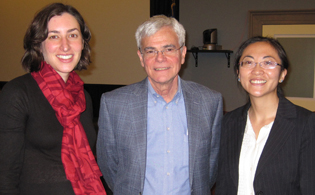Artificial Sweeteners and Leptin; Impaired Lipid Storage and Starvation
NIH’s Female Postdocs Discuss Their Research
The potential negative health effects of artificial sweeteners and the activities of cellular lipid droplets during starvation took center stage at NIH’s Women Scientist Advisors (WSA) Scholars Seminar, which featured the research accomplishments of two female postdoctoral fellows. Wei-na Cong described the effects of the artificial sweetener acesulfame potassium (ACK) on metabolism and cognitive function in mice. Sarah Cohen discussed the roles of lipid droplets in cellular responses to starvation. The women were selected as WSA scholars from the pool of 2014 Fellow Award for Research Excellence (FARE) awardees.

CLARISA BUCKNER, NIAID
The recent NIH Women Scientist Advisors Scholars Seminar—which Deputy Director for Intramural Research Michael Gottesman (center) attended—featured presentations by two female postdocs: Sarah Cohen (left) who is exploring new ways to image and analyze the activities of lipid droplets during starvation; and Wei-na Cong (right) who described the effects of artificial sweeteners on metabolism and cognitive function in mice.
Wei-na Cong, a postdoc in the laboratory of Bronwen Martin and Josephine Egan at the National Institute of Aging, noted that it’s important to understand the potential health effects of long-term artificial sweetener use because more people are using them in response to growing concerns about the increased prevalence of obesity and diabetes. Cong’s studies showed that mice that ingested ACK for 40 weeks—at a dose that is equivalent to what people frequently consume—produce higher concentrations of circulating insulin and leptin, hormones important in sugar metabolism and appetite control. Insulin tells the body to store sugar, and leptin plays a key role in regulating food intake, body weight, and energy homeostasis.
“We think the higher insulin was caused by ACK[’s] stimulating pancreatic cells to excessively secrete insulin,” Cong explained. “The increased leptin levels occurred because the mice became resistant” to leptin. Insulin concentration and leptin resistance are associated with obesity.
Her studies also revealed that ACK accumulated in the mice’s brain tissue and that the mice exhibited decreased cognitive function in the form of slow learning and impaired memory. ACK also affected energy metabolism in brain neuronal cells, inducing an “energy crisis” in the cells. “Energy metabolism for the neuronal cell is very important” for brain-tissue health, explained Cong. This work suggests that long-term ACK use may contribute to the development of cognitive disorders such as Alzheimer disease. She hopes that her research will contribute to the development of better public guidance for the use of artificial sweeteners.
Cong earned her Ph.D. in pharmacology at the Institute of Materia Medica, Chinese Academy of Medical Sciences and Peking Union Medical College (Beijing), where she studied fatty-liver disease and insulin resistance. Before joining NIH, she did postdoctoral research at the Hospital for Sick Children (Toronto) on the effects of leptin signaling on hepatic apolipoprotein B100 metabolism. She has presented her research at international conferences and published 16 peer-reviewed manuscripts, including a recent paper in PLoS ONE on her current research (PLoS ONE 8(8):e70257, 2013).
Sarah Cohen is exploring new ways to image, analyze, and model the role of lipid droplets—organelles that store and transport fats—in the cellular response to starvation. Lipid storage in cells is important: Organisms can draw from the lipid (fat) stores to generate energy during times of starvation. In disorders such as obesity and diabetes, the storage and use of lipids are impaired. The lipid droplet is a newly defined “organelle” within the cell that stores and transports lipids.
Cohen is using fluorescence microscopy to view the insides of cells and determine how the lipid-droplet lifecycle is influenced by starvation, how lipids interact with and are exchanged between organelles, and what mechanisms are used in the release and storage of lipids. In particular, she is investigating how lipid droplets interact with mitochondria—the “energy factories” of the cell—which are important for cell survival.
By observing cells in culture, Cohen discovered that during periods of starvation, a process called autophagy—in which the cell breaks down its own contents to produce energy—causes the cellular organelles to release fatty acids and thereby increase the production of lipid droplets. She also found that lipases, cellular enzymes that break down lipids, liberate fatty acids from lipid droplets for transport to the mitochondria to be broken down for energy. When this process is impaired in metabolic diseases such as diabetes, lipid storage and use may be impaired.
These discoveries are important for understanding the underlying mechanisms of disease and identifying potential treatments. “I think one hot area is the identification of proteins that mediate contact between lipid droplets and organelles,” Cohen said. “Those proteins could be potential drug targets.”
Cohen earned her Ph.D. in zoology at the University of British Columbia (Vancouver, B.C.) before becoming a postdoc in Jennifer Lippincott-Schwartz’s laboratory in the National Institute of Child Health and Human Development. Cohen recently published her graduate research on parvovirus (PLoS Pathog 9(10):e1003671, 2013).
The NIH WSA Scholars Seminar was sponsored by WSA and the NIH Office of Research on Women’s Health. The WSA committee, formed in 1993 under then–NIH Director Bernadine Healy, aims to advance the scientific careers and scientific contributions of women at NIH. Each year, the WSA invites two awardees from the pool of female FARE winners to present their research to the NIH community. To learn more about the history and activities of the WSA, visit https://sigs.nih.gov/wsa/
This page was last updated on Wednesday, April 27, 2022
